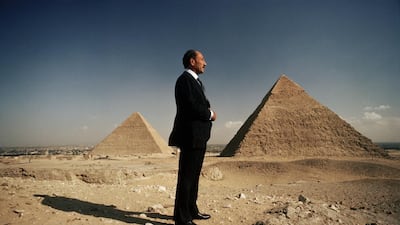If you want to figure where Egypt is going, toss out your economic models. I’ve come up with my own that beats them all.
I call it “seven years feast, seven years famine.”
Maybe I wasn’t the first to come up with it, but as an economic predictor it has worked like a charm.
Let’s start with the current situation. Not many would disagree that we’re in an economic morass at the moment, that began with the 2011 uprising, when tourists and investors fled from the country’s political instability.
Subtract seven years from 2011, and we’re in 2004. That was the year that Ahmed Nazif, backed by the then president’s son, Gamal Mubarak, was appointed prime minister and formed a government of economic liberalisers who slashed tariffs and income taxes and floated the Egyptian pound.
At the same time, tourism was just beginning to recover from earlier damage, and natural gas from world-class deposits, newly discovered in the Nile Delta basin, began coming on stream. It was a time of feast, if not equally shared, with annual GDP growth soaring to as high as 7.2 per cent in the 2007-2008 financial year.
The precision of the cycle is uncanny. Go back another seven years and we’re in 1997, the start of an earlier round of economic famine. That was the year of the Asian financial crisis, which caused investors to pull back from emerging markets throughout the world, and a drop in the international price of oil when Egypt was still a net energy exporter.
Also in that year, in November, gunmen in Luxor slaughtered 58 tourists at Hatshepsut’s Temple, wiping out the tourism industry. Poor management of the currency’s exchange rate guaranteed that the economic quagmire would last a full seven years.
Rewind seven more years and it’s 1990. That was the year, in August, when Iraq invaded Kuwait and Egypt agreed to send its army to help in the liberation. Over the next 12 months, the Arabian Gulf states and the Paris club of creditor nations agreed to cancel about US$25 billion worth of Egyptian foreign debt. That and a subsequent, much-reviled IMF agreement that nevertheless put the economy on track, spurred on seven years of feasting.
The debt forgiveness was not a moment too late, because before that, in the famine that started in 1983, the economy had been in desperate straits, with the president, Hosni Mubarak, having to fly to the Gulf every few months to secure finance for the latest instalment of the country’s expensive subsidised wheat programme.
Anwar Sadat’s open-door policy in the 1970s and the largesse delivered after the Camp David accords fed an expansion, starting in 1976, that erased the losses of the previous famine, which came during a period of wars in the region.
And seven years before that, Gamal Abdel Nasser’s nationalisations of 1961 and 1962 injected a vast, if short-lived, amount of wealth into the economy. This was preceded by an economic drought brought on by the break with the West beginning in 1955 and fanned by the 1956 Suez crisis, which sparked a rush by the country’s residents to send their capital abroad. Before that, the Second World War, after an initial boost for Egypt’s economy, began to bite in 1941 as austerity measures were imposed.
Like the Nile floods recounted in the holy books, many of these events were completely out of the control of Egyptians themselves. But others were the result of policies, bad or good.
What might this mean for investors today?
Assuming the cycle continues as it has for decades, it means they can expect the good times to return, but in the meantime we are possibly stuck with another three years of slump before the economy takes off again.
This agrees with what businessmen are saying, that it may take a few more years before tourism bounces back and for recently announced projects to get under way or start bearing fruit.
The cycle’s regularity may also mean that it’s a good time for investors to get in early.
Once the economy does take off, it may be wise to take a page from the story of Joseph, who advised the Pharaoh to set aside food and grain during the seven years of feast for the coming seven years of famine.
This time around, rather than filling the silos with grain, let the government stop squandering energy with wasteful subsidies and let it fill the economy with long-term investments. Rather than loading up the granaries, let it pour money into schools, solar energy, metro systems and other infrastructure.
Patrick Werr has worked as a financial writer in Egypt for 25 years for agencies including Reuters and Bloomberg News
business@thenational.ae
Follow The National's Business section on Twitter

